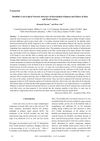 November 2022 in “Research Square (Research Square)”
November 2022 in “Research Square (Research Square)” Keratin-associated proteins have ancient origins and were used for different purposes before being adapted for hair in mammals.
 98 citations,
June 2001 in “Journal of biological chemistry/The Journal of biological chemistry”
98 citations,
June 2001 in “Journal of biological chemistry/The Journal of biological chemistry” A cluster of sulfur-rich hair protein genes was found on chromosome 17.
17 citations,
June 2003 in “The journal of investigative dermatology. Symposium proceedings/The Journal of investigative dermatology symposium proceedings” Mutations in hKAP1 genes may cause hereditary hair disorders.
 2 citations,
January 2017 in “Folia biologica”
2 citations,
January 2017 in “Folia biologica” The KRTAP7-1 gene is very similar across different cattle and yak breeds and likely plays a role in hair strength and shape.
8 citations,
May 2020 in “International journal of biological macromolecules” Certain treatments can increase protein binding to natural hair but are less effective on permed hair.
 70 citations,
December 2004 in “Differentiation”
70 citations,
December 2004 in “Differentiation” The study identified and characterized new keratin genes linked to hair follicles and epithelial tissues.
 28 citations,
December 2011 in “Biocatalysis and biotransformation”
28 citations,
December 2011 in “Biocatalysis and biotransformation” PDI helps restore over-bleached hair's strength and structure by attaching special peptides.
22 citations,
August 2015 in “PloS one” Keratin from hair binds well to gold and BMP-2, useful for bone repair.
27 citations,
November 2007 in “Genomics” Mutations in specific keratin genes cause improper hair structure in mice due to faulty keratin protein assembly.
12 citations,
October 2018 in “Biotechnology reports” Recombinant keratin K31 makes damaged hair thicker, stronger, and straighter.
 42 citations,
January 2017 in “Genes”
42 citations,
January 2017 in “Genes” The gene KAP22-1 affects wool yield and fiber shape in sheep.
 April 2024 in “Advances in Redox Research”
April 2024 in “Advances in Redox Research” Human hair strength and health are linked to sulfur compounds that can be reduced by stress but improved with sulfur supplements.
 4 citations,
January 2015 in “Sen'i Gakkaishi”
4 citations,
January 2015 in “Sen'i Gakkaishi” Hair and wool strength is affected by the number and type of bonds in their protein structures, with hair having more protein aggregates than wool.
 December 2023 in “The journal of physical chemistry. B (1997 : Online)”
December 2023 in “The journal of physical chemistry. B (1997 : Online)” Human hair keratin might be good for filtering out harmful substances from water.
86 citations,
May 2002 in “Journal of Investigative Dermatology” A new keratin, hK6irs1, is found in all layers of the hair follicle's inner root sheath.
75 citations,
September 2015 in “Acta biomaterialia” Alkylation of human hair keratin allows for adjustable drug release rates in hydrogels for medical use.
 13 citations,
March 2019 in “Journal of cosmetic dermatology”
13 citations,
March 2019 in “Journal of cosmetic dermatology” Heat damages hair, with Asian hair losing more protein than Caucasian hair.
 4 citations,
December 2018 in “Macedonian Journal of Chemistry and Chemical Engineering”
4 citations,
December 2018 in “Macedonian Journal of Chemistry and Chemical Engineering” A new method accurately measures amino acids in treated hair, showing bleaching reduces amino acids while protein treatments increase them.
 17 citations,
July 2018 in “International Journal of Cosmetic Science”
17 citations,
July 2018 in “International Journal of Cosmetic Science” Keratin-based particles safely improve hair strength, smoothness, and heat protection.
 January 2023 in “Czech Journal of Animal Science”
January 2023 in “Czech Journal of Animal Science” Proteins influence the quality and traits of cashmere goat fleece, affecting hair strength and diameter.
 59 citations,
September 2007 in “Biochemical and Biophysical Research Communications”
59 citations,
September 2007 in “Biochemical and Biophysical Research Communications” The TRPV3 gene mutation affects hair growth by keeping mice in the growth phase longer, which could help treat hair loss.
 26 citations,
May 2014 in “BioEssays”
26 citations,
May 2014 in “BioEssays” Using neurohormones to control keratin can lead to new skin disease treatments.
16 citations,
October 2021 in “Trends in biotechnology” Future hair products will use ecofriendly proteins and peptides to improve hair health and appearance.
 2 citations,
September 2022 in “Frontiers in genetics”
2 citations,
September 2022 in “Frontiers in genetics” Different proteins are linked to the varying thickness of sheep and goat hair types.
5 citations,
March 2017 in “Gene” CAP1 decreases the expression of a hair-related protein in young Tan sheep's skin.
 12 citations,
December 2017 in “Journal of biomaterials science. Polymer ed.”
12 citations,
December 2017 in “Journal of biomaterials science. Polymer ed.” Human hair protein extracts can protect skin cells from oxidative stress.
 7 citations,
November 2022 in “Communications biology”
7 citations,
November 2022 in “Communications biology” Keratin injections can promote hair growth by affecting hair-forming cells and tissue development.

Hair keratin treatments can be harmful, potentially causing health issues like skin reactions and cancer.
 47 citations,
January 2017 in “RSC Advances”
47 citations,
January 2017 in “RSC Advances” Keratin peptides can change hair shape gently without harsh chemicals.



















